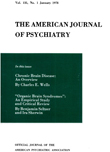Does attitude toward psychosis relate to outcome?
Abstract
In a previous follow-up of recovered schizophrenic patients, it was found that a positive, integrating attitude toward illness correlated with good outcome. In similar research at NIH, the authors of this study obtained partial replication of these findings. Specifically, the less negative patients were about their illness and future, the better their outcome. A very positive attitude was not associated with good outcome. Hence, the absence of a negative attitude appears critical. The authors failed to find a relationship between integration or isolation of the psychotic experience and outcome, which suggests the incidence of this (unconscious) psychological coping style from a conscious attitude and opinion about illness and the future.
Access content
To read the fulltext, please use one of the options below to sign in or purchase access.- Personal login
- Institutional Login
- Sign in via OpenAthens
- Register for access
-
Please login/register if you wish to pair your device and check access availability.
Not a subscriber?
PsychiatryOnline subscription options offer access to the DSM-5 library, books, journals, CME, and patient resources. This all-in-one virtual library provides psychiatrists and mental health professionals with key resources for diagnosis, treatment, research, and professional development.
Need more help? PsychiatryOnline Customer Service may be reached by emailing [email protected] or by calling 800-368-5777 (in the U.S.) or 703-907-7322 (outside the U.S.).



